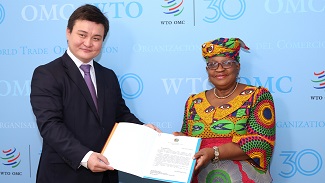Kazakhstan deposited its instrument of acceptance of the Agreement on Fisheries Subsidies on 1 July. Ambassador Asset Irgaliyev presented Kazakhstan’s instrument of acceptance to Director-General Ngozi Okonjo-Iweala.
Director-General Okonjo-Iweala said: “I welcome Kazakhstan’s Acceptance of the Agreement on Fisheries Subsidies. This action demonstrates Kazakhstan’s commitment, even as a landlocked nation, to responsible fisheries resource management. It underscores the need for global cooperation in safeguarding the shared marine ecosystem upon which all of us depend. I commend Kazakhstan for taking this step, which brings us closer to this Agreement’s entry into force.”
Ambassador Irgaliyev said: “We are so pleased that Kazakhstan can finally deposit its instrument of acceptance of the WTO Agreement on Fisheries Subsidies. This milestone underscores our dedication to sustainable fishing practices and marine ecosystem preservation. By joining this agreement, Kazakhstan aligns with global efforts to combat overfishing, and the prohibition of subsidies related to illegal, unreported, and unregulated (IUU) fishing is crucial. Moreover, it contributes to the UN’s Sustainable Development Goals, which are vital for ocean health, livelihoods, and food security. Kazakhstan, a landlocked country, proudly supports these global efforts for a sustainable future.”
Kazakhstan’s instrument of acceptance brings to 78 the total number of WTO members that have formally accepted the Agreement. Thirty-two more formal acceptances are needed for the Agreement to come into effect. The Agreement will enter into force upon acceptance by two-thirds of the membership.
Adopted by consensus at the WTO’s 12th Ministerial Conference (MC12), held in Geneva on 12-17 June 2022, the Agreement on Fisheries Subsidies sets new, binding, multilateral rules to curb harmful subsidies, which are a key factor in the widespread depletion of the world’s fish stocks. In addition, the Agreement recognizes the needs of developing economies and least-developed countries and establishes a fund to provide technical assistance and capacity building to help them implement the obligations.
The Agreement prohibits support for illegal, unreported and unregulated (IUU) fishing, bans support for fishing overfished stocks and ends subsidies for fishing on the unregulated high seas.
Members also agreed at MC12 to continue negotiations on outstanding issues, with a view to adopting additional provisions that would further enhance the disciplines of the Agreement.
